- Rose State College exists as a publicly created and sustained open-admission, associate degree-granting college to provide comprehensive lower-division programs of higher education and effective community services.
School Highlights
Rose State College serves 8,809 students (30% of students are full-time).
The college's student:teacher ratio of 18:1 is same as the state community college average of 18:1.
Minority enrollment is 51% of the student body (majority Black and Hispanic), which is less than the state average of 56%.
Quick Stats (2025)
- Enrollment: 8,809 students
- In-state tuition: $3,225
- Out-state tuition: $9,602
- Student:teacher ratio: 18:1
- Minority enrollment: 51%
- Source: Integrated Postsecondary Education Data System (IPEDS)
Top Rankings
Rose State College ranks among the top 20% of public schools in Oklahoma for:
Category
Attribute
Community Size
School Overview
The teacher population of 487 teachers has stayed relatively flat over five years.
Rose State College
(OK) Community College Avg.
Carnegie Classification
Associate's Colleges: Mixed Transfer/Career & Technical-High Traditional
Baccalaureate/Associate's Colleges: Mixed Baccalaureate/Associate's
Institution Level
At least 2 but less than 4 years
At least 2 but less than 4 years
Institution Control
Public
Public
Total Faculty
487 staff
154 staff
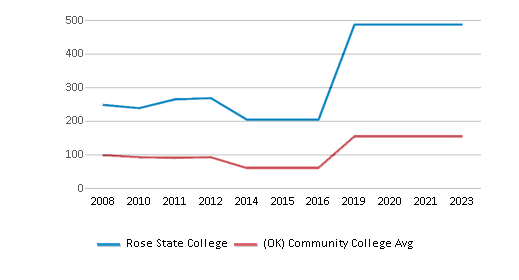
School Calendar
Student Body
The student population of Rose State College has grown by 25% over five years.
The student:teacher ratio of 18:1 has increased from 14:1 over five years.
The Rose State College diversity score of 0.71 is less than the state average of 0.76. The school's diversity has grown by 7% over five years.
Total Enrollment
8,809 students
1,473 students
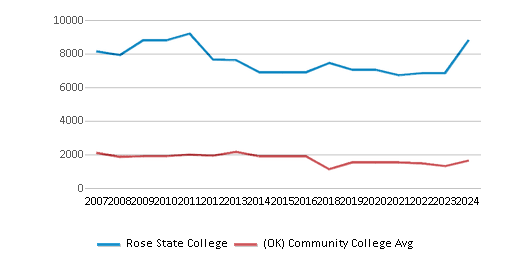
Student : Teacher Ratio
18:1
18:1
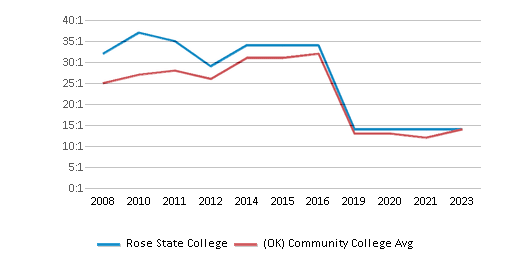
# Full-Time Students
2,628 students
663 students
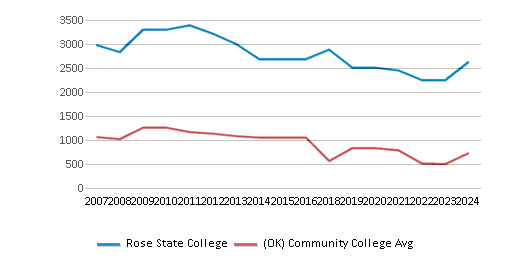
# Part-Time Students
6,181 students
1,058 students
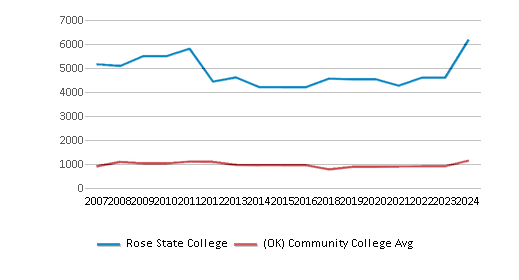
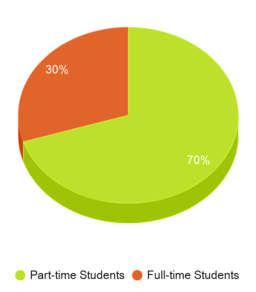
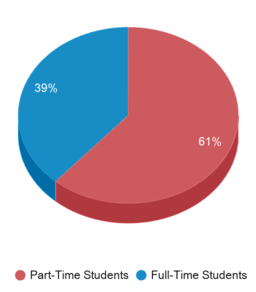
# Enrollment Undergraduate
880 students
236 students
# Full-Time Undergraduate Students
2,628 students
610 students
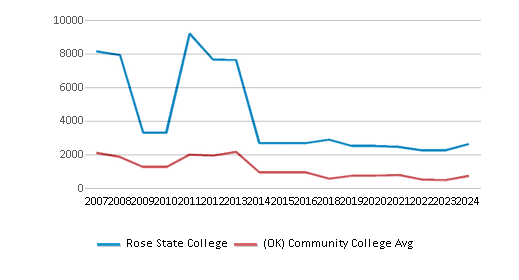
# Full-Time Graduate Students
n/a
5 students
# Part-Time Undergraduate Students
6,181 students
972 students
# Part-Time Graduate Students
n/a
14 students
Total Dormitory Capacity
294 students
300 students
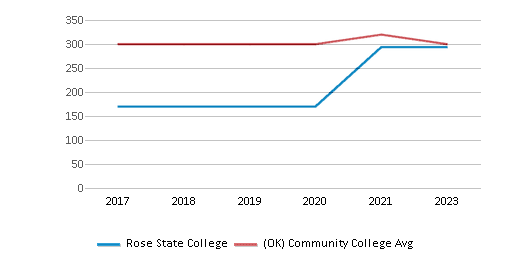
% American Indian/Alaskan
5%
8%
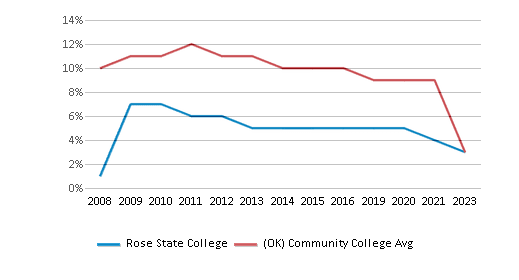
% Asian
2%
4%
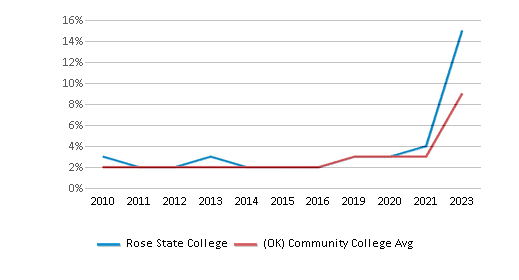
% Hispanic
10%
11%
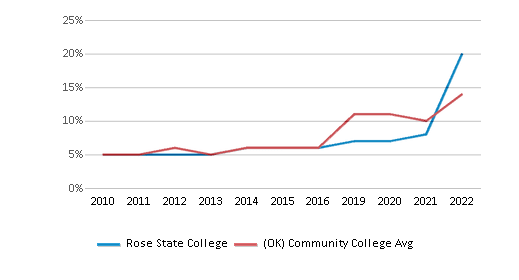
% Black
14%
10%
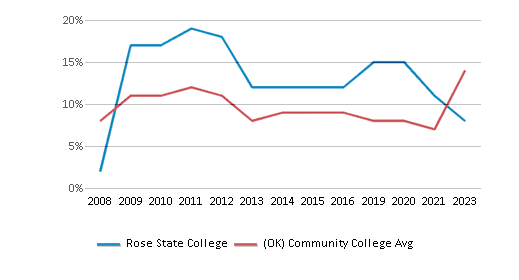
% White
49%
44%
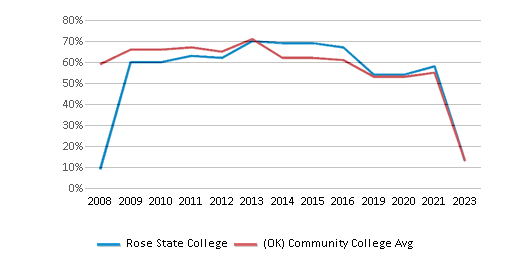
% Hawaiian
n/a
8%
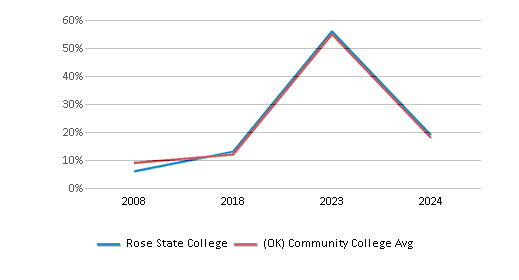
% Two or more races
13%
10%
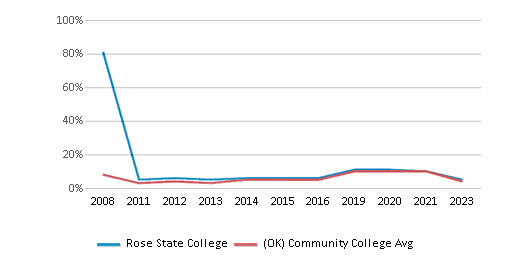
% Non Resident races
n/a
1%
% Unknown races
8%
4%
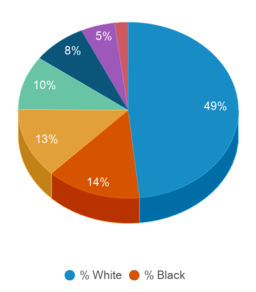
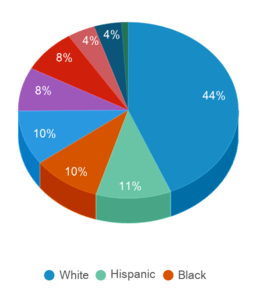
Diversity Score
0.71
0.76
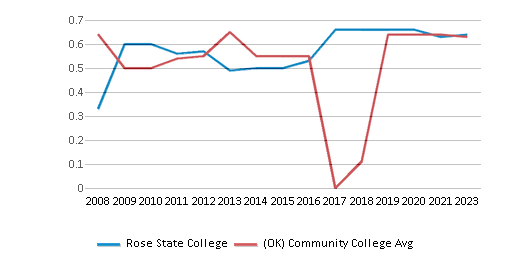
College Completion Rate (Students who graduate in less than 4 years)
0.2105%
0.5629%
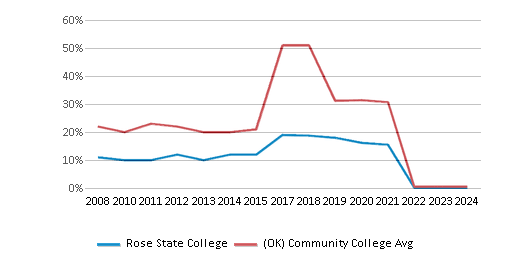
College Completion Rate (Students who graduate in 4 years or more than 4 years)
n/a
0.1525%
Average Graduate Earnings (10 Years)
$35,200
$34,700
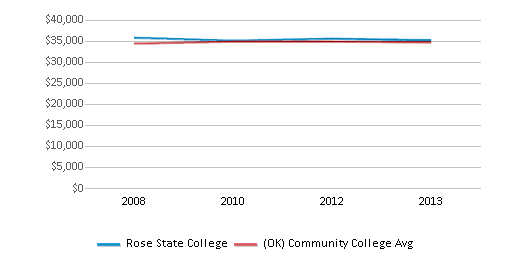
Tuition and Acceptance Rate
The public in-state tuition of $3,225 is less than the state average of $3,475. The in-state tuition has declined by 32% over four years.
The public out-state tuition of $9,602 is more than the state average of $7,963. The out-state tuition has declined by 13% over four years.
In-State Tuition Fees
$3,225
$3,475
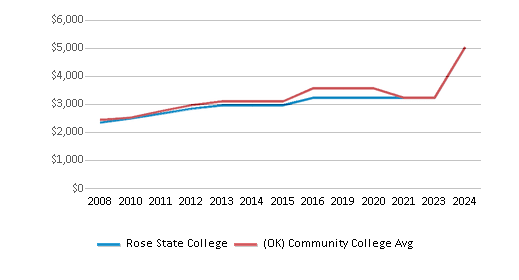
Out-State Tuition Fees
$9,602
$7,963
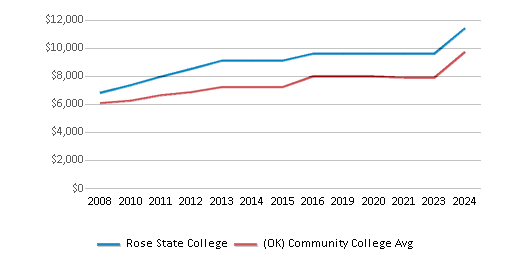
% Students Receiving Some Financial Aid
82%
88%
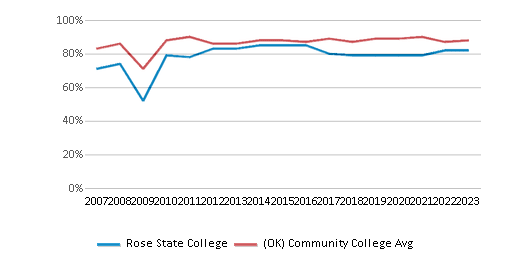
Median Debt for Graduates
$9,742
$12,000
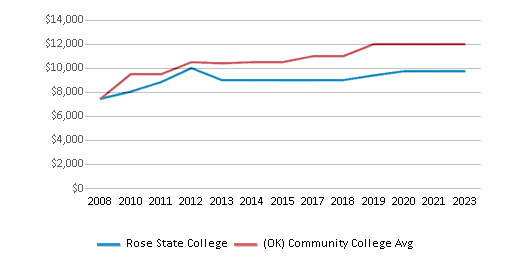
Median Debt for Dropouts
$4,285
$5,889
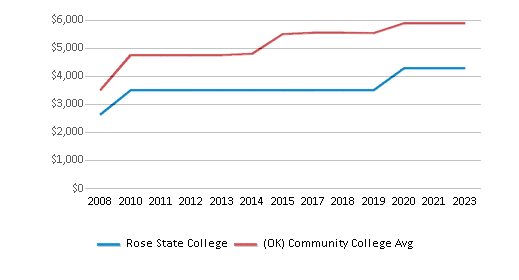
Acceptance Rate
n/a
55%
SAT Reading
n/a
387
SAT Math
n/a
475
ACT Composite
n/a
18
ACT English
n/a
17
ACT Math
n/a
18
Source: 2024 (or latest year available) Integrated Postsecondary Education Data System (IPEDS)
School Notes
- Rose State College offered its first classes on September 21, 1970. Originally named Oscar Rose Junior College in memory of the well-known Midwest City-Del City Superintendent of Schools, the school was renamed Rose State College effective on November 1, 1983. In December 1973, the College became a member of The Oklahoma State System of Higher Education, after approval from the College's Board of Trustees. The College has grown from an initial enrollment of 1,700 in 1970 to a regular fall enrollment of approximately 7,000. The campus now includes twenty-one buildings on approximately 116 acres. Rose State College has been authorized by the Oklahoma State Regents for Higher Education to provide programs and activities in General Education, Student Development Services, University Transfer Education, Economic Development Services, Career and Technical Education, Continuing Education and Contract Training Programs, Developmental/Remedial Education, selected Statewide Educational Services, Community Services and Institutional Research. Rose State College has been accredited as a degree-granting institution by American Bar Association, Commission on Accreditation of Allied Health Education Programs (CAAHEP), Commission on Dental Accreditation, Joint Review Committee on Education in Radiologic Technology, National Accrediting Agency for Clinical Laboratory Sciences, National Court Reporting Association (NCRA), National League for Nursing Accrediting Commission, The Higher Learning Commission; Member North Central Association, Oklahoma Board of Nursing, Oklahoma State Regents for Higher Education and State of Oklahoma State Accrediting Agency.
Frequently Asked Questions
How much does Rose State College cost?
Rose State College's tuition is approximately $3,225 for In-State students and $9,602 for Out-State students.
What schools are Rose State College often compared to?
Rose State Collegeis often viewed alongside schools like Oklahoma City Community College by visitors of our site.
What is Rose State College's ranking?
Rose State College ranks among the top 20% of community college in Oklahoma for: Largest student body.
Recent Articles

Obtaining Your Bachelor's Degree at a Community College
Explore the evolving landscape of community colleges offering bachelor's degrees, addressing affordability, accessibility, and workforce needs.

A to Z of Community College Certificates and Courses
From business and healthcare to technology and skilled trades, the article showcases the breadth of options available to students seeking to enhance their knowledge, develop new skills, or pursue career advancement.

What is a Community College?
This comprehensive guide explains what a community college is, its history, and its role in higher education. It covers the types of programs offered, differences from four-year colleges, benefits of attending, and important considerations for prospective students, providing valuable insights for those exploring educational options.










